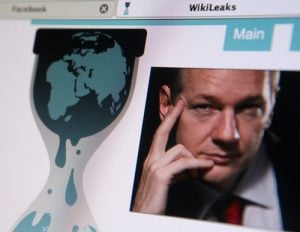How Psychological Vulnerabilities Are Exploited to Control Us

Dr Lissa Johnson is a clinical psychologist and columnist for the Australian news website New Matilda, with a background in media studies and sociology, and a PhD in the psychology of manipulating reality-perception. In an exclusive (electronic) interview with Eresh Omar Jamal of The Daily Star, Dr Johnson talks about a recent investigative series she wrote on the US government’s hunt for Julian Assange, how propaganda works, and the psychology that divides people and allows them to commit atrocities against “outgroup” members.
***
Eresh Omar Jamal: You recently wrote a detailed, five-part investigative series titled “the psychology of getting Julian Assange”. What inspired you to write it?
Dr Lissa Johnson: I began thinking about the series after attending a rally in Sydney in June 2018. A few months earlier, Ecuador had cut Assange off from the outside world and silenced him.
I expected to find large crowds at the rally, as Julian was in the news at the time, and a very well-known Australian journalist, John Pilger, was going to be speaking there. What I found when I arrived, however, was just a small gathering.
At the rally, Pilger gave a very powerful speech, in which he criticised the Australian media’s complicity in a long and vicious smear campaign against Assange. Afterwards, I was curious to see how the Australian media would report on Pilger’s speech, so I looked through mainstream publications for coverage of the rally. I expected to find biased and negative coverage, but what I found surprised me even more. I found nothing.
It was little wonder, then, that so few people attended. The Australian public didn’t even know that the rally had taken place.
This near-total media blackout struck me as extraordinarily co-ordinated and comprehensive. While making sense of this, I was also absorbing something that Pilger had said during the rally. He had placed the smear campaign against Assange in the context of a leaked 2008 document from the Cyber Counterintelligence Assessments branch of the US Defence Department. The document, Pilger explained, had outlined a plan to destroy the “trust” at WikiLeaks’ “centre of gravity”, all those years ago.
I came away thinking that a mission to destroy “trust” is a very psychological project for the Defence Department. As a psychologist, I could certainly see evidence of psychological knowledge all over the smear campaign against Assange. In fact, my PhD concerned the psychological processes by which one person influences another’s beliefs about reality, and it seemed to me that every effort had been made over the years to psychologically manipulate public perception, so as to not only destroy trust in WikiLeaks, but to turn reality-perception upside down—such that peace is bad, war is good, truth is dangerous, and censorship will set you free.
EOJ: How has psychology been used by the US and UK to persecute Assange and WikiLeaks?
DLJ: Psychological vulnerabilities in the human reality-processing system have been exploited over the last decade in order to push particular versions of “reality” concerning Assange and WikiLeaks, which depart starkly from the fully-informed, well-researched reality. In short, whereas WikiLeaks is a media organisation and Assange is an award-winning journalist (as confirmed by UK courts and tribunals), he has been cast as a terrorist and WikiLeaks an enemy of the state.
Similarly, whereas WikiLeaks, with its history of 100 percent accuracy, has exposed serious state-corporate crimes in the public interest, including civilian slaughter, it is the perpetrators of those crimes, with their long history of lies—particularly the Western national security state—that have been cast as trustworthy, noble and righteous.
Moreover, although covering up a crime is a crime, the cover-up of these crimes by silencing and imprisoning Assange, in violation of UN rulings and international law, is being cast as the legally upstanding position, with Assange as the criminal—for doing journalism.
In order to turn reality on its head in this way, a key psychological vulnerability exploited in the war on WikiLeaks has been the fact that human information processing is powered largely by emotion.
Even in terms of the neuroscience of cognition, emotion enters the decision stream well before conscious thought, and influences the kinds of reasoning and deliberation that people will entertain. The end result is that unless people are especially motivated to be accurate and factual, we are all susceptible to information and arguments that fit with our emotional states.
If we feel angry or disgusted about something or someone, for example, we are more likely to believe and accept damning rather than positive information about them. This all takes place on an unconscious level, outside our awareness, and plays a very powerful role in shaping our worldviews.
So, for opinion-shapers seeking to influence public perception of Assange, it is essential to manipulate the unconscious, automatic emotional associations with Julian. And one of the best ways to do that is to repeatedly pair a target with desired emotions, wiring an automatic emotional pathway in the brain, like water flowing down a gully on a hill.
In my articles, I wrote that a number of “news” stories about Assange have essentially served as vehicles by which to pair Assange’s name and face with negative emotions, such as anger, revulsion, resentment, suspicion and rage. This is the psychological equivalent of pinning an emotional bullseye to Julian Assange’s head, causing negative information—or misinformation—to stick.
Via the highly politicised Swedish investigation, for instance, Julian Assange has been repeatedly paired with the concept of rape, linking him to very visceral and raw emotions regarding rape and sexual assault, including anger, trauma, hatred and disgust.
This propagandistic function of the Swedish investigation has been facilitated by glaring irregularities in the investigation’s conduct. In fact, so poor has the conduct of the UK and Sweden been in this matter that the head of the Swedish Bar Association has called the handling of the Swedish investigation “deplorable”, adding that she fears that it has “damaged the reputation of the Swedish judicial system.”
Other tactics have been simply to pair Assange’s name with nasty personality traits, bad smells, poor hygiene and other emotive associations. Via Russiagate, spuriously linking him to both Donald Trump and Russia has also exploited the fear, shock and rage felt by many after the 2016 US election, pinning those feelings to Assange, and directing the lust for revenge his way.
All of these emotional tactics lay the psychological groundwork to plant narratives that are hostile to Assange and WikiLeaks, regardless of their factual inaccuracies and glaring omissions—and ultimately serve the same end: to foster a public mood that is supportive of, or at the very least indifferent to, the persecution of Assange.
They thereby facilitate the criminalisation of journalism, and trampling of free speech, via a host of dangerous legal precedents that are being set, as we speak, in Assange’s case.
The endgame of the entire endeavour has been to gain public consent to treat public interest journalism as public enemy number one, spelling death to numerous democratic freedoms, and government accountability.
EOJ: In your series, you mentioned the involvement of psychologists in wars waged by major western powers. Can you summarise that for us?
DLJ: The CIA and military do employ psychologists to undertake work of the highest “sensitivity” according to the US government’s own websites and promotional material, but the exact nature of much of that work is not publicly known.
Thanks partly to WikiLeaks and whistle-blowers, however, we do know that one function that psychologists have done for Western powers has been to design and implement a brutal torture programme. The programme was implemented both at the military prison Guantanamo Bay, and at secret CIA black sites around the world, as part of the “War on Terror”. The victims of this Bush-era torture programme, many of whom were innocent, were subjected to horrifically sadistic depravities under the direction of two licensed psychologists, with the knowledge and complicity of the American Psychological Association.
So heinous was the torture that torture expert and Associate Professor Dr Sandra Crosby reported, after examining one survivor, “In my many years of experience treating torture victims from around the world, [this patient] presents as one of the most severely traumatised individuals I have ever seen.”
Why would psychologists torture suspects in this way? To gather crucial intelligence to keep the world safe? Except that at the time it had been known since the 1980s that torture does not produce accurate intelligence. All that it can be relied on to produce is false confessions.
Which turned out to be useful in waging the Iraq War, as it happens.
According to former senior officials, a tortured false confession lurked behind Colin Powell’s infamous UN speech pressing for the Iraq War. So, directly or indirectly, psychologists played a part in fuelling the lies that manufactured consent for the illegal and disastrous invasion of Iraq. Much to our profession’s shame.
Thanks in part to WikiLeaks, however, the American Psychological Association (APA) has since revised its ethical procedures regarding psychologists’ involvement in torture. Not many people know this, but in 2011, when WikiLeaks released the Guantanamo Files, a group of psychologists who had been lobbying for ethical reform at the APS used evidence in the Guantanamo Files to finally hold the APA accountable, and bring about ethical change.
EOJ: You also talked about the use of propaganda and how it’s designed to exploit basic human psychological vulnerabilities. Can you tell us about that and how it ties to wars that have happened since 9/11?
DLJ: Where war is concerned, pro-war propaganda seeks to manipulate reality-perception such that good people will support the killing, maiming and immiseration of other innocent human beings, usually for power and profit. To achieve this, emotions supporting war must be mobilised, typically revolving around fear and hate.
A key psychological vulnerability that is exploited to achieve this is the human tendency towards group-based, us-versus-them psychology. As a social species, human beings are wired to organise themselves and their perception of the world into groups: into their own social and cultural groups, or ingroups (us) and other social and cultural groups, or outgroups (them).
A wealth of research over decades has shown that people are, unfortunately, susceptible to all kinds of destructive motives and attitudes towards outgroup members, particularly under conditions of insecurity and threat.
Whether measured psychologically, physiologically or neurologically, for instance, human empathy is lower towards members of outgroups than ingroups. People are more willing to torture outgroup members, and tend to view outgroups as less human, such that members of other social groups are viewed as less capable of human experiences such as pain, heartbreak and suffering.
Fortunately for war propagandists, callousness towards outgroup members can skyrocket from disdain to murderous rage under conditions of fear and threat.
Since 9/11, under the rubric of “war on terror”, to facilitate war throughout the Middle East, Islam has been falsely and repeatedly paired with the concept of terrorism in Western media and political discourse. Social psychologists Kevin Durrheim and others wrote that “call to arms discourse [such as this]…justifies violence by contrasting a virtuous ‘us’ with a savage ‘other’.” They describe the whole process as mobilising populations for war by mobilising hate.
Another related psychological vulnerability that is exploited in order to mobilise populations for war is the tendency, well-documented in the West, towards system justification. System justification is the drive to view one’s own social, political and economic systems in an unrealistically favourable light, rendering Westerners, on average, susceptible to messages that minimise their society’s flaws and glorify the status quo.
This tendency is exploited in Western wars by depicting “our” violence as virtuous, “our” wars noble and “our” leaders’ motives good, no matter how many millions of innocent people they have slaughtered, nor how many countries they have destroyed.
A large research literature has shown that most people (in the West) will system-justify even when confronted with their society’s flaws, such as corruption, inequality and violence. In fact, most people studied tend to double-down and defend the system even more forcefully in the face of systemic flaws, to maintain their faith in the status quo.
EOJ: Are we all vulnerable to these propaganda techniques?
DLJ: Although we all possess common human vulnerabilities in reality-perception, some of us are more susceptible—or resistant—to propaganda than others. Individual differences on propaganda-susceptibility need to be better studied, but given that official state-corporate propaganda is typically system-justifying, lower levels of system-justification (i.e. being less defensive of the status quo) are likely to foster resistance to official propaganda. Similarly, a less group-based, us-versus-them view of the world is likely to protect against many pro-war propaganda techniques.
More generally, in psychological research, curiosity is a human quality that protects people against misinformation such as propaganda. Individuals who possess what researchers call “science curiosity” are likely to be more motivated to seek out additional information, interrogate claims, and pursue an accurate, fact-based position, whether or not it fits with their initial biases and assumptions.
EOJ: Recently, we saw Christians in Sri Lanka and Muslims in New Zealand being viciously attacked in their places of worship. What can you tell us about the mind-set of those who carry out such attacks and how they view the “other”?
DLJ: In these tragic attacks, the “other” is viewed through the prism of group-based rivalry described above, which can be a very dangerous and deadly psychological state, particularly under conditions of fear and threat. Even when strangers are divided into groups based on nothing other than coin tosses or the colour of their T-shirts, group members tend to view each other with hostility, judgement and dislike.
When such group-based animosity is intensified by fear, then the “other” can come to be viewed not simply as inferior but as sub-human. Many psychological studies show that provoking fear of outgroups causes people to view outgroup members in dehumanised terms, fostering support for, and indifference to, violence of all kinds.
In psychological research with US subjects, for instance, just a single news article mentioning 9/11, or warning of unspecified future Islamic fundamentalist attack, causes sufficient group-based fear to prompt forgiveness of US atrocities in Iraq. In the real world, a constant barrage of such fear-based news articles since 9/11 has dehumanised Muslims sufficiently that Western populations have looked the other way while their leaders have killed somewhere between one and two million innocent people since 2001.
The underlying tactic is to cause nations and religions to fear each other, fuelling dehumanisation and a fight-to-the-death mentality. In this psychological environment, individual perpetrators of group-based violence such as the New Zealand and Sri Lankan massacres have taken the whole ugly process a deadly step further, by perpetrating the violence themselves rather than leaving it to the state.
EOJ: What role has the media played here? And what role should it play—along with academics, politicians and others—so that a “clash of civilisation” type of scenario, which is increasingly arising because of growing tension between different groups, can be avoided?
DLJ: Since 9/11, the emotions aroused by that event have been exploited and channelled into the War on Terror, being used to brand Muslims in general as dangerous and bad. This has been achieved in Western mainstream media and political rhetoric by repeatedly and spuriously pairing Islam with violent extremism, pinning an emotional—and literal—bullseye on the heads of millions of innocent Middle Eastern human beings.
On the other hand, if the media genuinely wished to prevent a clash of civilisations, and promote peace rather than war, it would seek to foster a sense of common humanity across group boundaries—geographic, cultural, social, ethnic and religious.
In psychological research, such a mindset is called identification with all humanity or psychological sense of global community. People who adopt this psychological standpoint value ingroup and outgroup members equally, viewing themselves as part of a larger human group.
Studies have found that identification with all humanity is related to positive support for human rights and human dignity across group boundaries, and to reduced support for war and violence. In one study, for example, simply asking Americans and Palestinian citizens of Israel to think about the shared human consequences of global warming led to reduced support for violence and increased support for peace.
In another study, subtle differences in the wording of a news article influenced whether readers were willing to support the torture of Muslim prisoners using the methods of Abu Ghraib. When Muslims were subtly humanised in news reports, by describing them using human qualities such as “passion” or “ambition”, readers were less supportive of torture.
In short, if they chose, our media and public figures could easily play a powerful role in fostering identification with all humanity, humanising members of other social groups, and reducing racism, intergroup violence and war.
Frankly, however, I don’t see that happening any time soon in the mainstream media in the West. Western media, like Western politicians, are reliant on military dollars, and are very closely entwined with the military-industrial-complex.
The Western independent, alternative, reader-funded media sphere, however, is a different story. There are many independent outlets that do a wonderful job of cutting across war propaganda, promoting a psychological sense of global community, humanising across social groups and promoting peace. It is precisely these media outlets, however, that the US national security state is seeking to shut down, in part by criminalising national security reporting such as that of WikiLeaks.
*
Note to readers: please click the share buttons above or below. Forward this article to your email lists. Crosspost on your blog site, internet forums. etc.
This article was originally published on The Daily Star. Eresh Omar is a frequent contributor to Global Research




